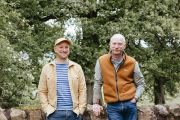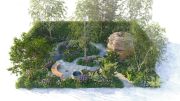Down’s Syndrome Scotland Garden
‘Down’s Syndrome Scotland Garden’ designed by RHS Chelsea newcomers Burton Hall Garden Design to be unveiled at the 2025 RHS Chelsea Flower Show.
Down’s Syndrome Scotland, the charity dedicated to helping everyone with Down’s syndrome living in Scotland reach their fullest potential through every age and stage of their life, will showcase a ‘show garden’ at the RHS Chelsea Flower Show (20-24th May 2025), before it is installed at Watch US Grow in Palacerigg Country Park, North Lanarkshire, Scotland. The Down’s Syndrome Scotland Garden, designed by RHS Chelsea newcomers Nick Burton and Duncan Hall of Burton Hall Garden Design, will be built at the site with the help of a group of young adults with Down’s syndrome. This project has been made possible thanks to the generous sponsorship of Project Giving Back, a grant-making charity that supports gardens for good causes at RHS Chelsea before relocating them to sites across the UK.
The garden will be an immersive, semi-wooded space celebrating and reflecting the unique qualities that people with Down's syndrome bring to society. A meandering path leads visitors through two distinct planting areas that convey contrasting moods: one of calmness and the other of playfulness. A water pool that initially appears to be a barrier to progress symbolises the daily challenges faced by people with Down’s syndrome who - despite huge progress in recent years - still experience stigma, often resulting in reduced opportunities and life expectancy. A submerged bridge within the water pool allows the ‘barrier’ to be overcome and visitors arrive at a welcoming shelter designed to look and feel like a warm and comforting ‘hug’.’
Inspired by Duncan’s nephew Liam (aged 7), who has Down’s syndrome and has been supported by Down’s Syndrome Scotland, Duncan Hall and Nick Burton of Burton Hall Garden Design said, “We are delighted to debut our first RHS Chelsea Flower Show garden at the show in May 2025. Visitors will discover a garden that highlights the qualities of people with Down’s syndrome and the issues they face in society. We want to challenge people to embrace the value and potential of people with Down’s syndrome. They have so much to offer us. We have designed a garden full of naturalistic planting with some botanically interesting varieties and are working with some excellent craftspeople to create interesting and inspirational design features.”.
Chief Executive of Down’s Syndrome Scotland, Eddie McConnell said, "We are incredibly proud, as a small Scottish charity, to throw a spotlight on the amazing people in our Down’s syndrome community through our RHS Chelsea Flower Show garden. None of this would be possible without the generous support of Project Giving Back. We want the garden to spark meaningful conversations about the challenges, barriers, and misconceptions that people with Down’s syndrome face, so that they can achieve in life what matters most to them. Duncan and Nick have captured the spirit of people with Down’s syndrome brilliantly in their garden design while not shying away from some uncomfortable truths – people with Down’ syndrome, like so many disabled people, still face prejudice and discrimination and that needs to stop.”
BurtonHall BH Garden Design Excitement is growing among members of the Down’s Syndrome Scotland community about their garden, with many volunteering and participating in activities relating to the design and preparing for its permanent relocation to North Lanarkshire in Scotland. Down’s Syndrome Scotland staff member, Cher Collins who has Down’ syndrome says, “I am so excited that we are being given this opportunity – I can’t stop smiling when we talk about the garden.”
Garden Features
A Hug in Nature: ‘Old School Fabrications’ based in East Lothian, Scotland has been commissioned to design, fabricate and construct at the show an organically-shaped garden building made from locally sourced sustainable timber. The shape and material of the garden structure are designed to feel like a comforting ‘hug’ and reflect the compassion, kindness and joy that come naturally to so many people with Down’s syndrome.
Breaking Barriers: The ground-level water pool with a submerged bridge located on the main path subtly references the barriers often faced by members of the Down’s syndrome community and speaks to their resilience and determination to overcome challenges to achieve their full potential. A Scot’s Pine, a Gaelic symbol of durability, will sit on the other side of the water pool.
Celebrating Difference: Down’s syndrome is caused by a third copy of chromosome 21 and these numbers are subtly reflected within the garden. For example, there are 3 water features and 3 seating areas, including bespoke benches made by traditional craftsman Laurence McIntosh from Edinburgh with 3 feet and 21 slats. Additionally, 21 tiles by ceramic artist Frances Priest and a playful water feature evoke a sense of fun and mischief, whilst a bunting display of 21 ‘odd, knitted socks’, chosen because they look like chromosomes, will be hung inside the garden building to celebrate difference and provide a sense of fun.
Playful Water Features: There will be three water features; two above-ground water containers, made by Bronzino, which are based on a Scottish Highland cauldron design, whilst a ground-level pool located across the path symbolising societal barriers faced by people with Down’s syndrome. There is also a secret water spray that can be activated by depressing a decoratively patterned Frances Priest ceramic tile to incorporate some fun and mischief into the garden.
Pathways of Joy: The 21 playful and curious tiles by ceramic artist Frances Priest are inlaid into the paving, contributing to the garden’s sense of joy as visitors enjoy the artful playfulness beneath their feet. Inside the garden building, 21 knitted odd socks which were chosen as they look like chromosomes, will be hung as a bunting display, to add a playful touch which celebrates difference.
Gaelic Proverb Symbolism: One of the bespoke benches by Laurence McIntosh of Edinburgh will have the old Gaelic proverb "Cruaidh mar am fraoch, buan mar an giuthas” which translates to “Hard as the Heather, Lasting as the Pine” engraved on it and will sit under the Scots Pine. This proverb acknowledges the strength, resilience and endurance that people with Down’s syndrome display in their everyday environments.
Sustainability: The plant-dominated garden incorporates minimal hard landscaping, sustainable construction methods (e.g. screw foundations and cement-free mortar) and planting grown in peat-free compost.
Key Plants
(A full plant list is available upon request) Consisting of around 2,500 plants the garden planting is split into two styles – a greener, calmer zone adjacent to the garden building representing a sensitive and calm zone and a more colourful and playful zone side behind the bench which will include a variety of structural, green and colourful Herbaceous plants representing fun, discovery and joy. To include:
- Betula nigra (Black birch): Trees chosen to provide a light, wooded feel for the garden
- Pinus sylvestris (Scottish evergreen pine tree): A Gaelic symbol of durability and a metaphor for fulfilled potential
- Iris sibirica (Tropic Nigh): Chosen to provide a contrasting upright form as well as showing colourful flowers
- Primula florindae (Tibetan cowslip ): A bright, vibrant colourful plant, which expresses a sense of fun in the scheme
- Arisaema candidissimum (Striped cobra lily): If growing conditions are favourable this Spring, this unusual and captivating plant will bloom white spathes throughout May with pink candy stripes inside
The Relocation
After being showcased at the RHS Chelsea Flower Show (20-24th May 2025) the garden will be transported to its permanent home and managed in partnership at Watch US Grow, which is based in Palacerigg Country Park, North Lanarkshire, Scotland.
Watch US Grow is a charity dedicated to making positive changes in the lives of adults with additional support needs, they create educational and purposeful opportunities for people to learn new skills, gain life experience and be part of an organisation where they are treated equally.
A number of people with Down’s syndrome attend Watch US Grow and will be actively involved in the reconstruction of the garden at Palacerigg. The garden is expected to be open to the public in Autumn 2025/Spring 2026.


